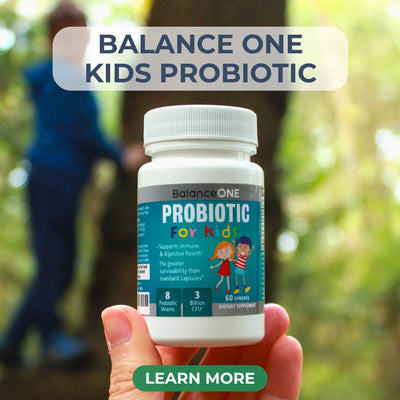If you’re a parent, you’re probably well aware that your kids should be getting some form of probiotic support in their diet.
But while fermented foods such as sauerkraut and kimchi are a great way for adults to get a dose of probiotics, kids aren’t always a fan of these foods!
Probiotic gummies seem like the perfect solution for making children take their probiotics. Gummies are just like a tasty treat: sweet, fun, and easy to eat! Surely they’re the perfect way to boost your child’s gut health?
In fact, it’s the “tasty treat” appeal that has seen the popularity of gummy products soar in recent years. They now make up more than $1 billion of the $41 billion supplement market in the United States. That’s an increase of more than 25 percent since 2015.
But are they actually effective?
Well, there’s little evidence that probiotic gummies have any benefit at all. In fact, they may do more harm than good.
Why Are Probiotic Gummies A Poor Choice?
While the concept of a probiotic gummy is great, the composition is generally not. Gummies tend to contain a range of not-so-healthy ingredients such as sugar or artificial sweeteners.
Many also contain added artificial ingredients such as food coloring and citric acid to keep the product stable.
Gummy candy is generally composed of gelatin, sweeteners, flavorings, and colorings. It can be molded into all sort of novelty shapes, which makes it a fantastically versatile candy product.
First developed in Germany over a hundred years ago, gummy candy gained great momentum in the United States during the 1980s. Today, it continues to be popular with kids and adults alike.
But could it ever be a health product?
Here's a breakdown of the ingredients contained within most probiotic gummies – and why they may not be the best choice after all.
Sugar
Most gummy products – whether candies or vitamins – are made with sugar. Sugar, after all, provides the sweetness that makes a food item desirable – especially for fussy kids.
The problem with gummy probiotics is that the amount of sugar can outweigh the benefits of the probiotic itself. Sugar is the perfect ‘fuel’ for pathogenic bacteria and yeast in the gut, which means that combining sugar with a probiotic is somewhat counterintuitive.
Eating excess sugar early in life is linked to obesity, high blood pressure and type 2 diabetes. These problems put children and young adults at a much higher risk of heart disease.
In addition, regular sugary treats can predispose kids to a sweet tooth – which can have severe implications for their weight management later in life. Worse, those sugary treats can mean kids have less room in their tummies for ‘real’ food – vegetables, fruits, and whole grains.
Gums
Guar gum, Locust Bean Gum, and Gum Arabic are common ingredients in gummy candies. While these ‘natural’ gums have a variety of health benefits, they also have some unwelcome effects on the gut. This can be particularly harmful to a young digestive system.
Studies have also shown that some gums can have gastrointestinal side effects such as gas and bloating.
In one study where participants took 21g of guar gum every day for 3 months, two participants quit the study due to their extreme gas and abdominal bloating. (1)
As a general rule, gums can be problematic for those with sensitive digestive function. A very small amount of guar gum in foods and supplements is generally OK, but larger amounts (such as in gummies) should be avoided if possible.
Probiotic Gummies Are Unlikely To Be Effective
One of the unfortunate truths about many probiotic supplements is that the bacteria contained within them often have little protection against stomach acid.
This means that they’re unlikely to survive the passage through your gut – and even less likely to provide many health benefits.
In order for probiotics to reach the small intestine and colonize the gut, they must first be able to withstand the acidic environment of your gastrointestinal tract. This is why many probiotic supplements provide no benefits at all. Research has suggested that up to 96 percent of probiotics are killed off by stomach acid.
Simply put: if the probiotics aren’t delivered in a form that protects them from stomach acid, those living organisms will be ruined before they can do any good.
Probiotic gummies not only contain very small amounts of probiotic bacteria, but they have almost zero protection against those harsh elements of the gut. The likelihood of those bacteria reaching the small intestine and providing any benefits to a young tummy is very small!
A Better Probiotic Supplement For Kids
Look for a probiotic supplement in a form that kids are able to ingest easily, such as a small tablet. It should also contain a wide variety of strains, particularly Lactobacillus (such as L. rhamnosus, L. plantarum, L. acidophilus) and Bifidobacterium (such as B. longum and B. lactis).
Make sure the supplement also has a high colony-forming unit count (CFU) and is free from additives such as sugar and colors.
Most importantly, choose a probiotic that has some form of delayed time-release technology which helps guarantee the passage through the gastrointestinal tract.
Our kids probiotic uses patented BIO-tract technology to protect its probiotic bacteria from stomach acid for longer. It’s made from natural, high-grade raw ingredients – unlike the chemicals which tend to be contained in other probiotic supplements like gummies.
It uses time-release tablets which have been shown to be 15 times more effective than vegetable capsules at delivering probiotic bacteria to the gut. And each tablet is a tiny 6mm sphere, lightly flavored with stevia, that kids above 4 years old can take very easily.

